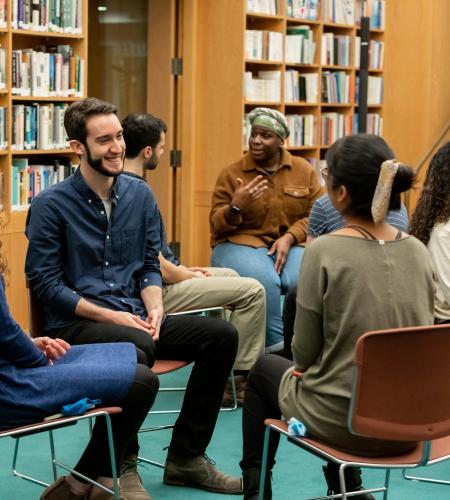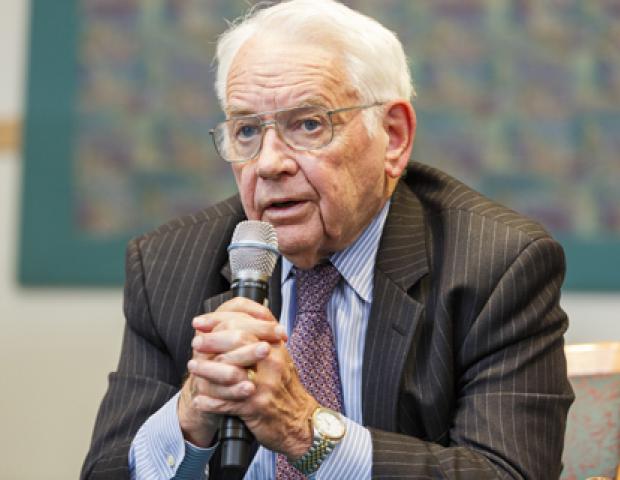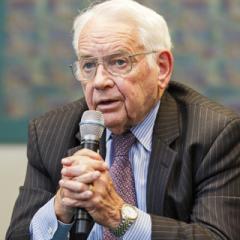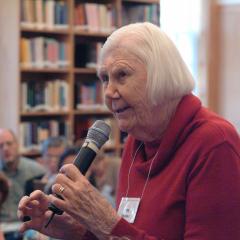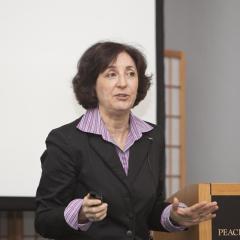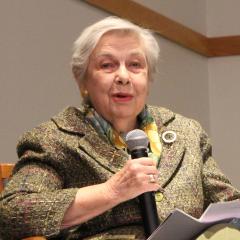Peter Stearns is University Professor at George Mason University, where he also served as provost from 2000 to June 2015. His areas of research and teaching include world history, social history, globalization, and the history of emotions. Dr. Stearns has served since 1967 as editor-in-chief of the Journal of Social History and has published widely in his areas of expertise. This interview covers themes related to his 2014 title, Peace in World History. Provost Stearns spoke with Ikeda Center publications associate Mitch Bogen on September 16, 2015.
You’ve had a long and distinguished career as an historian. Why peace? Why now?
There are two related answers to that. First of all, I lived through the Cold War, and as the Cold War eased, I began to realize that some of the things I had assumed during the conflict were inaccurate. I had simply accepted the notion that the United States needed a very large military to repel aggression, and initially I felt that the Vietnam War was justified. I now do not think it was justified. So part of my answer is that in my own life I learned that I had not grown up with a proper appreciation for peace and the values of peace and the need to cut through some of the common arguments for military activities and wars. That’s one answer.
The second answer, quite honestly, is my experience with the Ikeda Center and the writings of Dr. Ikeda, and particularly his statement that each of us as a global citizen should figure out what we can do to promote peace. That had a profound impact on me. And, obviously, as an historian, one thing I can do is to try to use history to clarify conditions for peace. So: a reaction to my own experience, particularly with the Cold War, the inspiration of Dr. Ikeda, and the notion that we need to think much more explicitly about peace. That’s what drew me to try to do this book and offer some courses in the history of peace.
How did it happen that you came to see your earlier beliefs about war and militarism as wrong? Was this an awareness that built slowly over time?
Yes. You learn that the Cold War was not just the result of Russian activities, but also American activities and Allied activities. You learn that the Russian move to surround itself with buffer states after World War II, while I think it was wrong, was not entirely unexplainable and did not mean that the Russians were bent on world conquest. We learned that the situation was more complex than the sort of good-versus-evil rhetoric that informed so much of the Cold War. And the Vietnam War, as it wore on, made it clear that we were allowing the Cold War to draw us into military activities that were unnecessary and cruel, and that we needed to be able to rethink those approaches.
As you researched the book, was there anything that surprised you?
Yes, frankly. I’m a little embarrassed to say because some of the things that surprised me I should have known already! I did not realize, for example, how deeply pacifist early Christianity was. Now, it later changed, but I found it very interesting to explore the deep-seated commitment to peace that prevailed among early Christians. I had not realized the flowering of peace movements and peace ideas after 1815 in the Western world. These things simply had not been part of my historical background previously, and those and some other points really helped me understand that there was real substance to an exploration of peace in world history, that it wasn’t just a matter of working around the edges of war.
Have any of your colleagues reacted to your peace research by suspecting that maybe you’ve gone a bit soft? I ask only half jokingly, because sometimes I almost feel apologetic when I introduce my peace-related work to people, as if someone’s going to think it’s naïve, or something like that.
I sympathize with that, and I think, frankly [laughs], the reaction I get to the notion that I’m working on the history of peace, is that it must be a very short subject! It’s not so much a sense that it’s a soft subject, but there is the sense somehow that war is the more normal human approach and that, as I mentioned, peace just works in around the edges. You know, most of my historian colleagues are fairly liberal and fairly skeptical about some aspects of American military policy, so, while I don’t think they are terribly interested in the history of peace, they don’t see it as a soft or silly subject.
This reminds me of a notion put forward by peace scholars such as the late Elise Boulding that peace is actually more fundamental to our lives than violence.
Absolutely. Yes. That’s a point I try to make particularly in my teaching. And I agree with you entirely. War is a failure. Early Chinese writing about war, Sun Tzu and so forth, made it clear that war represents a failure of policy, and peace is the more normal, as well as the more desirable approach.
I’ve also heard it said that war is a failure of imagination. I can’t recall who said it, but it certainly sounds true. *
And this goes back a bit to your interesting point about a slightly apologetic tone. It’s also important to establish that peace in many cases requires more courage than war does.
What is it in particular about Daisaku Ikeda’s work and thought that inspires you?
Well, the depth of the commitment, and the careful way he frames not only the quest for peace but the qualities that accompany that — his definition, for example, of global citizenship. ** In other words, he’s not just advocating peace; he’s taking a thoughtful approach to the conditions, the kind of knowledge, the frames of mind, that are essential to promote peace. So: depth of commitment; the recommendation, the plea, that each global citizen accept a responsibility for peace; and the intelligent and flexible way he lays out the sub-conditions for peace — all of these strike me as extremely persuasive, very impressive.
What is it going to take for this kind of careful thinking about peace, along with a deep commitment to it, to become predominant, to become our default setting?
Well, that’s a great question, and I wish I had a clear answer. I think the current conditions in the United States make this approach very difficult. We’ve been involved in war so frequently that I think that many Americans really believe, not necessarily happily, that war is the normal state. We feel that we’re assailed by enemies from abroad, we have a deep commitment to military response, and we have figured out how to make war without too much interference with normal civilian activity back home. That’s a very powerful combination. I don’t quite know how to break into this mindset, but I think that open discussions of peace and efforts to intervene in political debates and make peace a clearer criterion for political candidates are vital. I was impressed, or rather depressed by the last presidential campaign, by the extent to which peace was almost never mentioned. Security is often mentioned, but it’s not the same as peace.
So, I think: open discussion; trying to figure out new formats in which peace can be discussed; and trying as I’m trying, to urge that history courses pay a bit more attention to peace, rather than focus simply on war as a highlight of the human experience. I think we need to proceed in these ways, and frankly, I think the results at best will be gradual. It’s going to be hard to convert the mindset.
What are the most important habits of mind that people can develop to further peace?
In addition to the overall qualities of global citizenship, and here I reference Dr. Ikeda — the importance of understanding other cultures, the importance of understanding global interconnectedness, the importance of empathy — I think we need to urge people to think about peace, again, as a more explicit goal. I think many Americans, because of the way we’ve experienced recent conditions, and because of the way we’ve learned history, many Americans are likely to assume peace is simply a temporary expression of weariness and it’s not an explicit commitment. So we need to make clear that peace has to represent an explicit commitment. It’s a goal.
We should be spending as much time talking about the causes of peace as the causes of war, rather than assuming that peace is somehow a minor interlude between conflicts. We need to look at historical conditions and conditions in other regions where peace has been more clearly valued and clearly achieved. The American experience in this regard — although we have a really important peace tradition in the United States — the American experience in this regard is not entirely typical. We had after all a substantial commitment to militarism in the westward expansion and then our belated imperialist program. Isolationism was a significant episode but based more on avoidance than on a pursuit of peace. Most obviously, the experience since 1940, and particularly the emergence as “world’s only superpower,” provide a distinctive combination, different even from Western Europe which has moved toward a different set of priorities.
Elise Boulding also suggested that we should explicitly visualize what a peaceful society or world would look like. How would you visualize it?
I’m not sure I have a complete statement here, but this explicit commitment to peace as a primary value is part of the response. And, referring back to the appreciation of cultural differences, I would identify the importance of tolerance, the realization that we do not need to envisage a world in which every society accepts our particular approach to things and our value system — a recognition of diversity and the recognition that societies can be quite successful that are rather different then our own. These are crucial components of imagining a more peaceful world.
Does the US need to be the world leader? Many people insist that a Pax Americana is our best bet.
This has to be something that’s debated. The clearest point is that having the United States in our current military situation is an unnatural historical phenomenon, and probably an unhealthy one. It makes us arrogant. It makes us careless. It makes us assume that we can order the world around to a degree that actually is impossible and undesirable. So, although the Cold War was scary, and led to a number of really mistaken policies, the Cold War in some ways was healthier, because neither side could claim that they were somehow the conscience of humanity.
It seems like we don’t even analyze the impact of our military actions. I believe that if we look closely at Viet Nam, as you did, it should make us question or reconsider the efficacy of military violence. And the same seems true of Iraq.
I think the Iraq thing is really interesting. Apparently now we have a national consensus that the invasion of Iraq was a mistake. And that’s very interesting, because we didn’t agree on that until recently. But relatively few people are going the next step and saying, okay, if it was a mistake, then how on Earth did we make the mistake? Why did two-thirds of the American people approve of the war? We need to reconsider our approach more fundamentally and not simply say, “Yes it was a mistake, but by the way we don’t necessarily need to learn much from it.”
There is also the disturbing notion that so-called preventive military action is OK. That it’s just another tool in your international toolbox.
Right. In that respect we probably need among other things, and this would be part of a historical approach to peace, we need to go back to some of the fundamental discussions of just war that occurred earlier in the world’s history. The just war idea was not a pacifist idea; it has its own limitations. But it’s at least superior to the notion of preemptive strikes and the rule of force.
One current situation that I struggle with as a proponent of nonviolence is the threat of ISIS. I’m doubtful that peaceful means such as dialogue would be effective with them.
I find it difficult also. I do not know what the appropriate short-term approach is to this issue. It’s tempting to say that at the very least we need to make some contacts with ISIS to see if discussions could be broached that might limit further conflict, but it’s a little hard to imagine.
